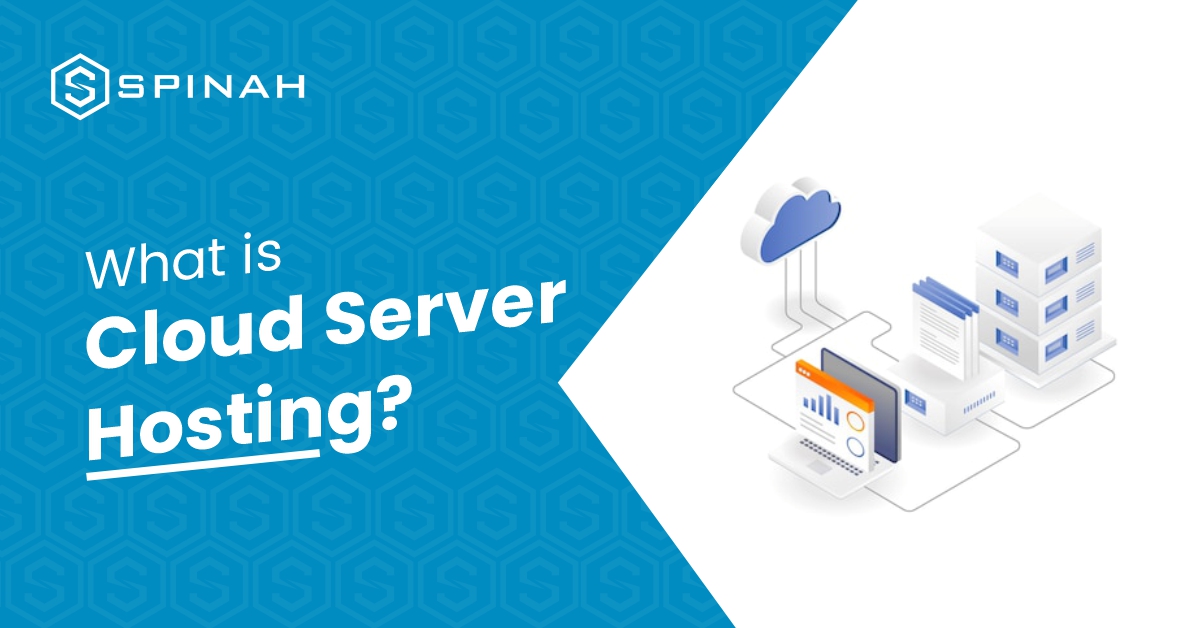More and more businesses are using cloud hosting solutions to make their systems more scalable, flexible, secure, reliable, and cost-effective.
Whether you’re just starting a new venture or looking to upgrade existing infrastructure, the advantages of cloud servers are hard to ignore.
Read on for an in-depth look at cloud hosting services—from understanding the terminology and benefits to finding reliable providers, get ready for all the knowledge you need about moving your data into the proverbial clouds.
Let’s dive in.
Cloud Server Hosting and How it Works
Cloud server hosting is a web hosting that utilizes a network of remote servers, also known as a “cloud,” or virtual server, to store and manage website data, unlike known on-premises servers or traditional servers. Instead of hosting a website on a single physical server, cloud hosting stores and manages data on a network of servers.
Cloud hosting is a popular option for businesses and organizations that want a flexible and low-cost way to host their websites. Because the cloud comprises multiple servers, if one fails or experiences technical difficulties, the website can still function because the data is stored on and accessed from multiple servers. This provides greater uptime and reliability compared to traditional single-server hosting.
To use cloud server hosting, website owners typically sign up for cloud hosting plans with a cloud hosting provider. The provider will then set up and manage the cloud plan infrastructure and resources, allowing the website owner to focus on building and managing their website.
Cloud server hosting stores website data on multiple servers within the cloud. When a user visits a cloud host’s website, the data is retrieved from the cloud and displayed to the user. The hosting company always checks and fixes the cloud to ensure it works well and runs smoothly.
Types of Cloud Servers
Cloud hosting platforms come in different varieties, depending on the user’s needs. Some of the most popular types include:
Public Server
Public networks or servers are a type of cloud service that is available to anyone with internet access. These servers are hosted in a virtual or cloud environment and provide users with an easy and cost-effective way to store, process, and access data from anywhere in the world. This allows businesses to scale their computing infrastructure while reducing hardware acquisition costs.
Some examples of public cloud servers are AWS, IBM Cloud, Microsoft Azure, and Google Cloud Platform. Unlike traditional servers, a public server offers enterprises a wide range of services and features that can help them quickly build applications without needing to manage physical infrastructure.
Private Server
Private servers are hosted in a secure, private environment owned by a single organization or individual. These servers usually store susceptible data and are accessed exclusively by authorized personnel.
Additionally, these cloud servers provide businesses with flexibility in terms of scalability and resource allocation. Unlike public cloud servers, users of private cloud hosting are not subject to the demands of other users and can customize their environment according to their needs.
Hybrid Server
Hybrid cloud services are the perfect blend of local and cloud servers and offer both advantages. A hybrid cloud service combines the cost-effectiveness of on-premise hardware with cloud-based services’ reliability, scalability, and agility.
For example, businesses can choose to use a private cloud for their internal applications that contain sensitive data while also using public clouds from AWS or GCP for web apps and production workloads.
Hybrid cloud services also allow businesses to integrate data stored in multiple siloed systems into a single user interface, ensuring quick access and ease of use. Consequently, hybrid cloud service models have become the go-to solution for many businesses seeking the best of both worlds.
Multi-Cloud Server
Multi-Cloud is a cloud computing service delivery model that allows organizations to mix and match services from multiple cloud vendors. Instead of relying solely on a single cloud provider, businesses can reduce risk, optimize costs, and improve performance by utilizing services from multiple cloud providers.
For example, Amazon Web Services might be used for web hosting while Microsoft Azure provides databases or media storage, or each vendor could provide specific components of a single application.
By structuring their system in this way, businesses can take advantage of the different strengths that each provider offers, such as advanced features or cost savings.
Cloud Service Models
Cloud services are online solutions or virtual machines that enable businesses to store and access data and applications through the internet. This can include anything from email hosting, web hosting, file storage, software as a service (SaaS), platform as a service (PaaS), or infrastructure as a service (IaaS).
Software as a Service (SaaS)
Software as a service (SaaS) is a revolutionary way of providing access to software applications. With SaaS, users don’t have to purchase or install software on their devices. Instead, the system is cloud-based, allowing users to rent and access the program from any device with a secure internet connection.
This makes SaaS reliable, cost-effective, and efficient for businesses and individuals. Furthermore, with SaaS, the user can always count on having access to the latest software version, eliminating the need for costly upgrades or replacements.
This cutting-edge technology simplifies workflows and increases productivity while protecting valuable data through continuously updated security protocols. Investing in software as a service helps ensure hassle-free software management in the future.
Platform as a Service (PaaS)
Platform as a Service (PaaS) is the foundation of modern digital developments. It enables companies to develop, manage, and launch applications quickly and efficiently. PaaS allows customers to focus on creating their applications while completely outsourcing all the hardware and software operations to cloud vendors.
This equates to less money spent on hardware investments and IT improvements, with more storage resources available for developing business applications without worrying about infrastructure scalability or availability.
With features like serverless computing, continuous integration, and delivery pipelines, developers can deploy faster than ever before. Businesses can stay ahead of the competition by being open to new ideas and using up-to-date technologies throughout the application lifecycle.
Logging as a Service (Laas)
Logging as a Service (Laas) is a cloud-based service that enables organizations to store, manage, and analyze logs generated by their systems. This gives businesses the flexibility and scalability they need to understand their applications and infrastructure better.
The concept of “Logging as a Service” (Laas) was created to enable businesses to access and store their logs in the cloud, allowing them to leverage the scalability and reliability of cloud storage while minimizing costs. With Laas, companies can easily monitor their systems by providing continuous monitoring, alerting, and data analysis.
Laas has become increasingly popular as businesses seek to maximize efficiency and effectiveness when it comes to tracking performance and troubleshooting issues. Laas can also help organizations comply with regulatory requirements such as GDPR and HIPAA by securely storing logs in the cloud.
Benefits of Cloud Server Hosting
Cloud server hosting benefits businesses of all sizes in a variety of ways. Here’s a quick look at some of the top benefits of cloud computing:
Cost Savings
One major benefit of cloud computing server hosting for businesses is cost savings. This is advantageous for a small business or a large enterprise; utilizing cloud hosting has several cost-saving advantages.
For instance, businesses save significantly by eliminating hardware costs and requirements, experiencing less downtime due to the automatic maintenance of backup systems due to hardware failure, and paying only for the services used rather than provisioning for peak usage.
Using cloud servers also reduces operating costs because companies only need a few IT staff with technical skills to manage complex server farms and can get cheaper access to centralized shared resources.
Scalability
With cloud servers, businesses can adjust their computing and storage needs on demand. This makes it easy for businesses to scale up or down depending on how much work they have.
Businesses can quickly take advantage of growth opportunities and new markets because they can control their capacity without worrying about infrastructure or hardware costs. They can make a small upfront investment or do simple system upgrades.
Reliability
Cloud servers are always available by utilizing multiple data centers with a geographically distributed architecture, even if one or more data centers go down. Also, cloud hosting providers have sophisticated monitoring systems; they can proactively address any issues that arise quickly and ensure your application remains up and running even without you having technical skills.
Security
Cloud server hosting also offers enhanced security. Utilizing the latest encryption technology, cloud servers are secure and less vulnerable to external threats. Additionally, cloud hosting providers have a variety of measures in place to safeguard customer data from any type of malicious attack or intrusion.
This include using two-factor authentication, allowing customers to control their access and authentication processes, and providing an additional layer of security with DDoS protection.
Convenience
Cloud server hosting provides tremendous convenience when it comes to quickly and flexibly scaling resources to accommodate a business’s needs. Resources are immediately available, as physical waiting time is removed from the equation.
Furthermore, because cloud server hosting avoids overcommitting resources and underutilizing capacity, there is no need for capital investments in on-premise infrastructure. With cloud technology, businesses can respond to dynamic market demands efficiently and in a cost-effective way since any additional space required can be added on in an instant.
Wrapping Up
Cloud server hosting quickly becomes the go-to solution for businesses looking to increase reliability, scalability, and cost savings while keeping data secure. Utilizing cloud servers allows businesses to keep their applications running without worrying about hardware or maintenance costs.
Cloud hosting allows businesses to grow rapidly and take advantage of new markets without investing in costly infrastructure. With all the advantages cloud servers offer, it’s no wonder more and more companies are making the switch.
FAQS
Cloud hosting utilizes a network of remote servers, also known as a “cloud,” to store and manage website data. On the other hand, server hosting refers to hosting a website on a single physical server.
Cloud hosting provides flexibility, scalability, and reliability as websites can access the resources and infrastructure of multiple servers. Server hosting is less flexible and may not be suitable for websites with high traffic or changing resource needs.
Example of cloud hosting providers are Amazon Web Services (AWS), Microsoft Azure and Google Cloud Platform. These cloud service providers allow businesses to rent servers and accessible storage space on-demand, making it easy for them to scale up their resources without having to invest in more hardware.
The term “cloud server” is derived from the cloud computing model, which refers to a distributed network of servers and resources used for storage or processing power. The “cloud” in cloud servers refers to the fact that these services are located on remote servers connected over a network, thus making them accessible over the internet.
Yes, Microsoft 365 is a cloud-based productivity suite that includes a range of applications, such as Office Online, SharePoint, OneDrive, and Teams. It runs on Microsoft Azure, a cloud computing platform that hosts web applications and services.
A cloud server is better than a web server because it offers more flexibility in terms of scalability and reliability. Cloud servers are typically cheaper to operate than web servers, as they don’t require expensive hardware or maintenance.












